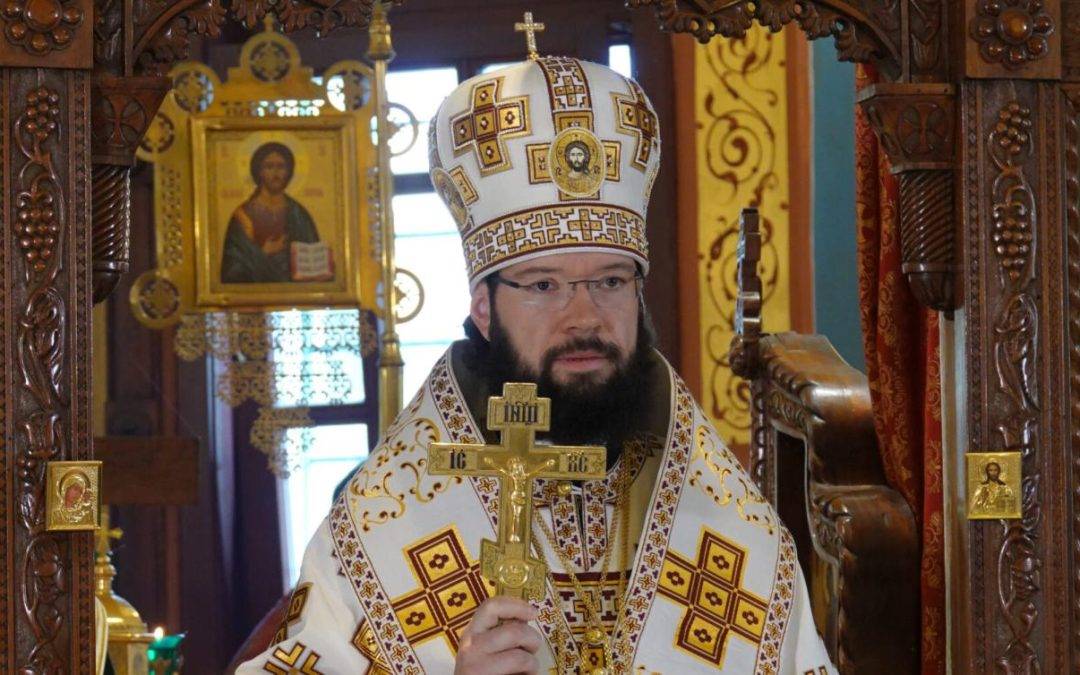
TV Temple: Interview with Metropolitan Anthony of Volokolamsk
Exclusive interview with Metropolitan Anthony of Volokolamsk, Chairman of the Department for External Church Relations of the Moscow Patriarchate, for the Television Temple of the Serbian Orthodox Church
The Holy Trinity Cathedral of the Courtyard of the Russian Orthodox Church in Belgrade was built in 1924 according to the plans of the architect Valery Stashevsky for Russians who fled from the communists after the October Revolution. They were mostly educated people, members of the upper classes of society, believers. A hundred years later, the first century of this Belgrade, Russian and pan-Orthodox shrine was solemnly and prayerfully marked.
The conference entitled "100 Years of the Holy Trinity Church of the Russian Orthodox Church in Belgrade and its Relations with the Serbian Orthodox Church" was held on November 15, 2024, at the Palace of Serbia. In addition to the Minister for the Social Position of the Church in the Country and Abroad, Dr. Nenad Popović, the Vicar of the Serbian Patriarch and Bishop-elect of Great Britain and Ireland, His Eminence Nektarios, the Head of the Russian Church of the Russian Orthodox Church, Archpriest Vitaly Tarasyev, a special address was given at this gathering by His Eminence Metropolitan Anthony of Volokolamsk. He traveled to Serbia precisely on the occasion of the great jubilee of the Holy Trinity Church. The visit attracted great attention from the media, Serbian, Russian and regional, since he is the Metropolitan and the Chairman of the Department for External Church Relations of the Moscow Patriarchate, that is, the head of Russian church diplomacy.
After the conference, the visit to Novi Sad and the service on the day of the city's glory with His Holiness Patriarch Porfiry of Serbia and His Eminence Metropolitan Irinej of Bačka, and then the Holy Liturgy and the celebrations on the occasion of the anniversary in the Russian Church, Metropolitan Antonije, in an exclusive interview with Television Khram, speaks about the impressions he will take away from Serbia, but also about all the current issues of Orthodoxy in the world.
– Bless, Your Eminence. How do you assess your visit to Serbia, what impressions will you take away from here?
– This is not the first time I have visited Serbia, I have been to your wonderful, hospitable country several times. This time too, the reason for my arrival is special, because we are celebrating the wonderful date of one hundred years since the consecration of the Russian Church of the Holy Trinity in Belgrade. And answering the question about my impressions of my visit to your country and from my previous visits to Serbia, I would like to say that I feel the same way as the Russian exiles who, by the will of God, found themselves in your country a hundred years ago, who found themselves far from their homeland, who lost everything, were here without work, without means of livelihood, but they found hospitality in Serbia, warm brotherly love and felt here not as if they were in exile, but as if they were at home. Due to my obligations as the President of the Department for External Church Relations, I travel a lot, but here in Serbia I never feel as if I am abroad, but rather I feel at home, among my family, close and dear people, which is very dear and very important to me. I am very glad that these days I have the opportunity to talk with His Holiness Patriarch Porphyry of Serbia and with the bishops of the Serbian Orthodox Church. We have already had the opportunity to visit Novi Sad and met with Metropolitan Irinej of Bačka, a prominent Orthodox theologian, a personality who enjoys enormous authority in the Russian Orthodox Church. We also met with another of our brothers, and this is very important and valuable for us, because unfortunately it is no secret that the Orthodox world is currently going through a difficult chapter in its history. Today there is a division between the Orthodox Churches. Frankly speaking, there are tense relations between individual Local Churches, but speaking of the relationship between the Russian Orthodox Church and the Serbian Orthodox Church, we can say that they are characterized by absolute unanimity, full mutual understanding on all issues that are on the agenda of inter-Orthodox relations. For us too, this is very important and very, very valuable.
The Chairman of the Department for External Church Relations of the Moscow Patriarchate, Metropolitan Antony Sevruk, was born in 1984 in Tver. He graduated from the famous Tver Lyceum with a gold medal, and while still a student he served as an altar server and subdeacon in the Resurrection Cathedral in Tver. In 2002, he entered the St. Petersburg Theological Academy by decision of the teaching council without taking entrance exams. He successfully defended his thesis “Eschatology in World Religions” and received the prize of Metropolitan Nikodim (Rotov). He then worked as an intern in the Information Sector of the Department for External Church Relations of the Moscow Patriarchate, an assistant to Metropolitan Kirill of Smolensk and Kaliningrad (now Patriarch of Moscow and All Russia), and a lecturer at the Smolensk Theological Seminary. Since February 2009, he has been the personal secretary of the Patriarch of Moscow, and in the same year, Patriarch Kirill tonsured him into monasticism, giving him the name Anthony. In 2015, he was elected Vicar Bishop of Bogorodsk, with the task of caring for parishes in Italy, and was appointed head of the Moscow Patriarchate's Office for Institutions Abroad. In 2017, he was appointed head of the Diocese of Vienna-Austria and Budapest-Hungary, and in 2019, Patriarch Kirill elevated him to the rank of metropolitan. In 2022, he was appointed chairman of the Department for External Church Relations and a permanent member of the Holy Synod of the Russian Orthodox Church with the title of "Volokolamsk".
– Because of your experience and knowledge, Your Eminence, the question arises as to how you approach the analysis of the state of the Orthodox world today? Let us mention just two problems: Kosovo and Ukraine.
– You have asked a difficult question, but it is also what unites our peoples, what unites our Churches. I am deeply convinced that a person who has never experienced suffering cannot sympathize with another person, just as one who does not know what true joy is cannot be happy for another. In the history of our peoples there is a common sorrow, a common suffering. For the Serbian people, this is Kosovo. And we very much understand your pain. Recently, we were deeply outraged that His Holiness Patriarch Porfiry was denied entry to Kosovo. Our Patriarch was so upset about this that he wrote a letter to His Holiness Patriarch Porfiry in which he expressed our support at this difficult moment for him. We truly appreciate the support we receive from the Serbian Church in the context of what is happening in Ukraine today, because, just as Kosovo is the source of Serbian Orthodoxy, so Kiev is for us the baptismal font of Holy Russia. That is where we received our faith. And the fact that today in Ukraine the largest Christian denomination in this country, the Ukrainian Orthodox Church, is subjected to the most incredible public persecution, and all this is covered up by the almost absolute silence of the world community. For us, this is a deep tragedy and a deep pain. Our church, as you know, went through very difficult trials in the 20th century. We lived in a situation where the powerful leader of the Soviet Union promised to show the last living priest on television. But today, it seems, all this should be a thing of the past. And we see how in the 21st century a country that declares its commitment to the principles of democracy and freedom, today persecutes priests, bishops, believers of the Ukrainian Orthodox Church. Today we live in a situation where bishops of the Ukrainian Church are being held in prison, are under house arrest, are being subjected to harassment, and churches are being forcibly taken away from believers. Of course, all we can do today is appeal to the world community and encourage them to pay attention to what is happening in Ukraine. We do this, but to be honest, we do not always receive support, understanding, or even any answers.
And from the side of the Serbian Church, its Primate, His Holiness Patriarch Porfiry, its Synod, its bishops who are not afraid to courageously raise their voices in this situation and support our persecuted brothers and sisters, we receive support for which, believe me, the Russian people are very grateful. We will never forget this. We will always remember this with great gratitude and great love. You ask the question of how to get out of this situation. I think that for us, for Christians, the answer is obvious: we must all act according to our conscience and in everything we do we must be guided by the Holy Gospel. If we talk about the situation in Ukraine, then it is completely clear that a church schism is taking place there today, in which the state is clearly interfering, and that it is happening contrary to the canons, contrary to the Orthodox understanding of what the Church is. Today we are forced to believe that the Ecumenical Patriarch, sitting in his office in Istanbul, can, with a single signature, make a layman a “bishop”, to accept as a bishop a person who has never had any canonical ordinations, neither deacon, priest, nor bishop. We will never agree with this, because all of us, including myself, when we were ordained to the priesthood, took an oath and promised to live according to the canons. Of course, we must act in accordance with our conscience in matters related to rights, the rights of people to the opportunity to know their origins, the opportunity to freely visit those places that concern their history and
– Allow me to answer this question as one of the youngest bishops of the Russian Church. I communicate a lot with my peers and I understand perfectly well that everyone has their own path to the temple. Someone is baptized since childhood and lives and grows up in a believing family, so for them being in the church is something natural and logical. Someone comes to the Church at a later age, at school or at university and takes the first step into the temple and stays in the temple. But at the same time, in every society, and I believe that Serbia is no exception, there is always a thirst to hear the word of God. But not everyone can take the first step to come to the temple on their own. I know from the experience of my country and from the experience of my peers with whom I communicate, that for many, it is not so easy, passing by the church, to enter the temple and stay there. Therefore, the Church should always look for opportunities to reach people, to find the way to their hearts. In fact, this is what the apostles did. And the Apostle Paul and his famous words that he became all things to all people, in order to save at least the chosen ones, mean that the Church must always, in the conditions of rapid changes in the world, find the opportunity to reach all people with the Gospel. Today we live in the era of communications, in the era of the development of social networks. This is something that no one understood twenty years ago and no one thought that life would develop like this. And it seems to me that the opportunity to reach people through the media is, first of all, an opportunity to convey the word of God to the younger generations of Christians, future Christians. And I really see many today, watching interviews with good priests, reading priests who are bloggers, who convey the word of Christ through their social networks, reading good Telegram channels, many through this begin to think about what Christianity is, begin to think about what the Church is and in this way find the path to Christ. Once again, I emphasize that the path is different for everyone, but the Church, it seems to me, should open all doors, all possible doors, to give people the opportunity to come to Christ. Everything else is in God's hands. The Lord leads everyone on His own path. For some, this door may be suitable, for someone else, another. Our Patriarch Kirill, His Holiness the Patriarch of Moscow and All Russia, who was the rector of the Theological Academy for many years and communicated with young people, was himself one of the first to begin to address people through the media, through television. For many years, he hosted a wonderful program called The Word of the Shepherd, which was broadcast on Saturdays on Channel One on television. As a very young schoolboy, I watched that program and was amazed at how, then still a metropolitan, His Holiness Kirill finds a way to convey complex issues of Christian theology to young people like me, in the simplest and most understandable forms. I know that for many it became a kind of window that brought them to the Church. That was then, twenty years ago, when there was only television. Today there are many more such tools. And our Patriarch, having become the head of the Russian Church, encourages all priests to actively go to the people, to go in an accessible way and with means that they understand, in which they are able to find real opportunities, to go and reach out to people with it and create an opportunity for everyone to discover the Church, to discover Christ. That is why now we have Orthodox TV channels, not just one. Moreover, they are included in the Russian state broadcasting package, i.e. all people who have satellite television can watch Orthodox channels. In addition to everything, there are also wonderful priests who, as I have already said, run their own blogs, their own Telegram channels. I know that for many, especially modern people, for those who spend most of their time on social networks, such priests, such Telegram channels and other means of communication were their first step on the path to the Church. Therefore, to me, as a still young person, this seems very important. And it is wonderful that the Serbian Church today is doing a lot to get closer to people through the media and convey the Gospel message to them.
After Belgrade and Novi Sad, the Chairman of the Department for External Church Affairs of the Moscow Patriarchate, Metropolitan Anthony, traveled to Banja Luka. We, despite all the challenges that Orthodoxy faces in the world today, are left with a strong good impression after his statement that “the Russian Church in Belgrade is a bridge between two sister churches that are connected by the warmest relations”. To many summers!
Interviewed by: Sanja Lubardić, editor-in-chief of Television Hram and Radio Slovo ljubve
Translated from Russian: Deacon Nikolaj Sapsay
Source: Serbian Orthodox Church
PHOTOS
RELATED ARTICLES
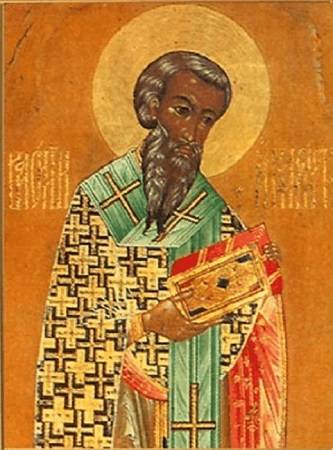
Calendar for May 9 His Homilist Basil of Amasia
Licinius, the son-in-law of Emperor Constantine, whose sister he had married,...
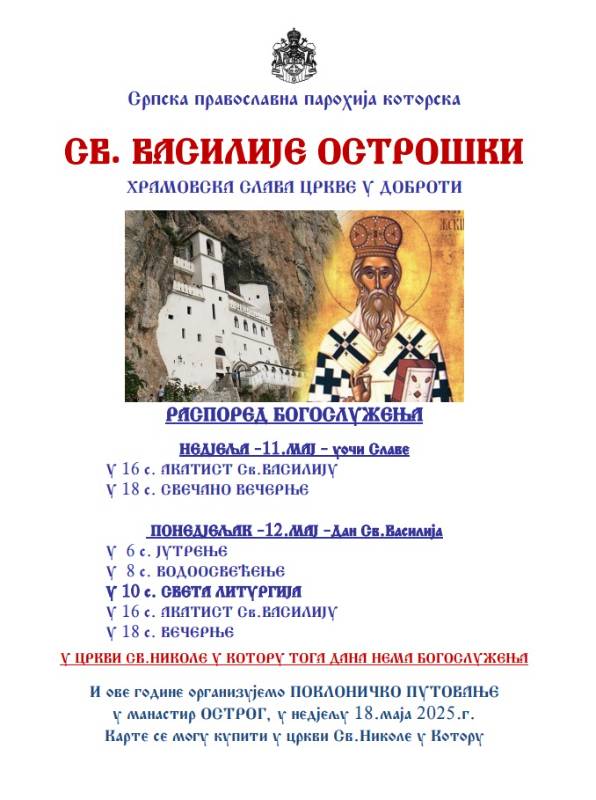
WORSHIPS ON THE OCCASION OF ST. VASILIJE OSTROŠKI
SERBIAN ORTHODOX PARISH OF KOTOR ANNOUNCES WORSHIPS ON THE OCCASION OF ST....
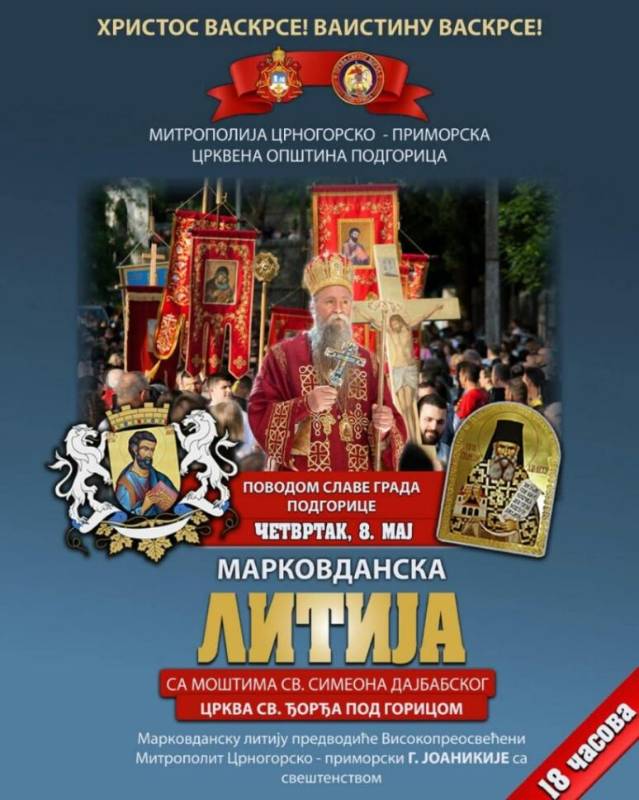
St. Mark's Day procession in Podgorica
On the occasion of the celebration of the city of Podgorica, the...


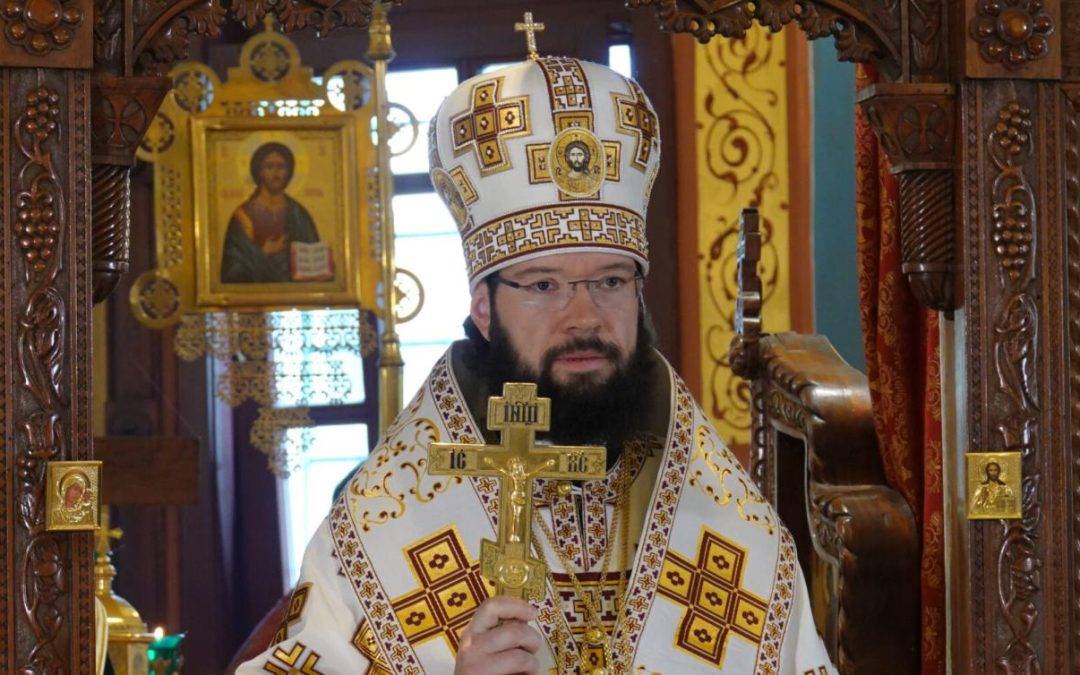

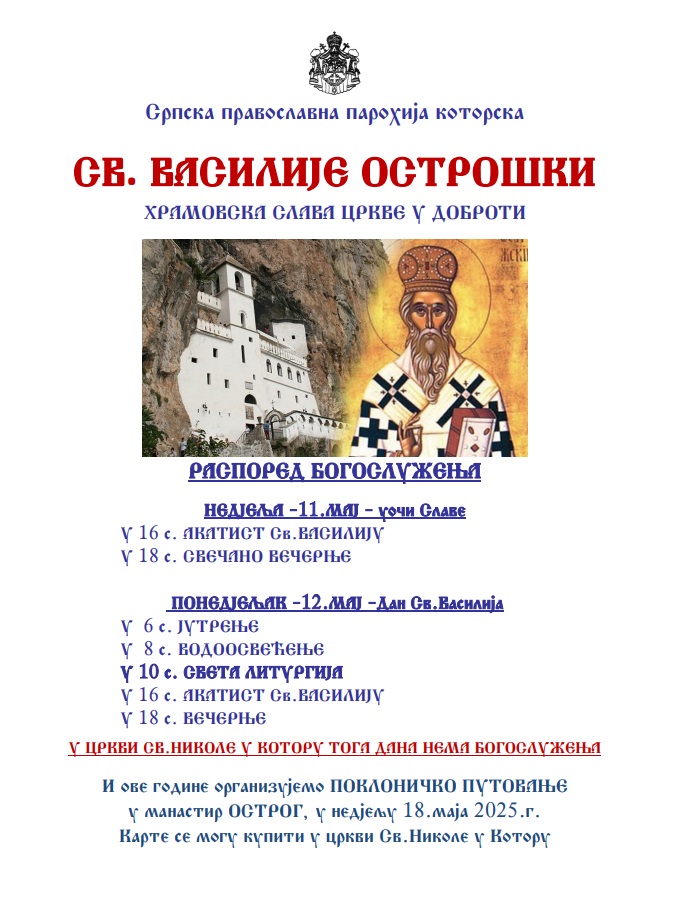
.png)